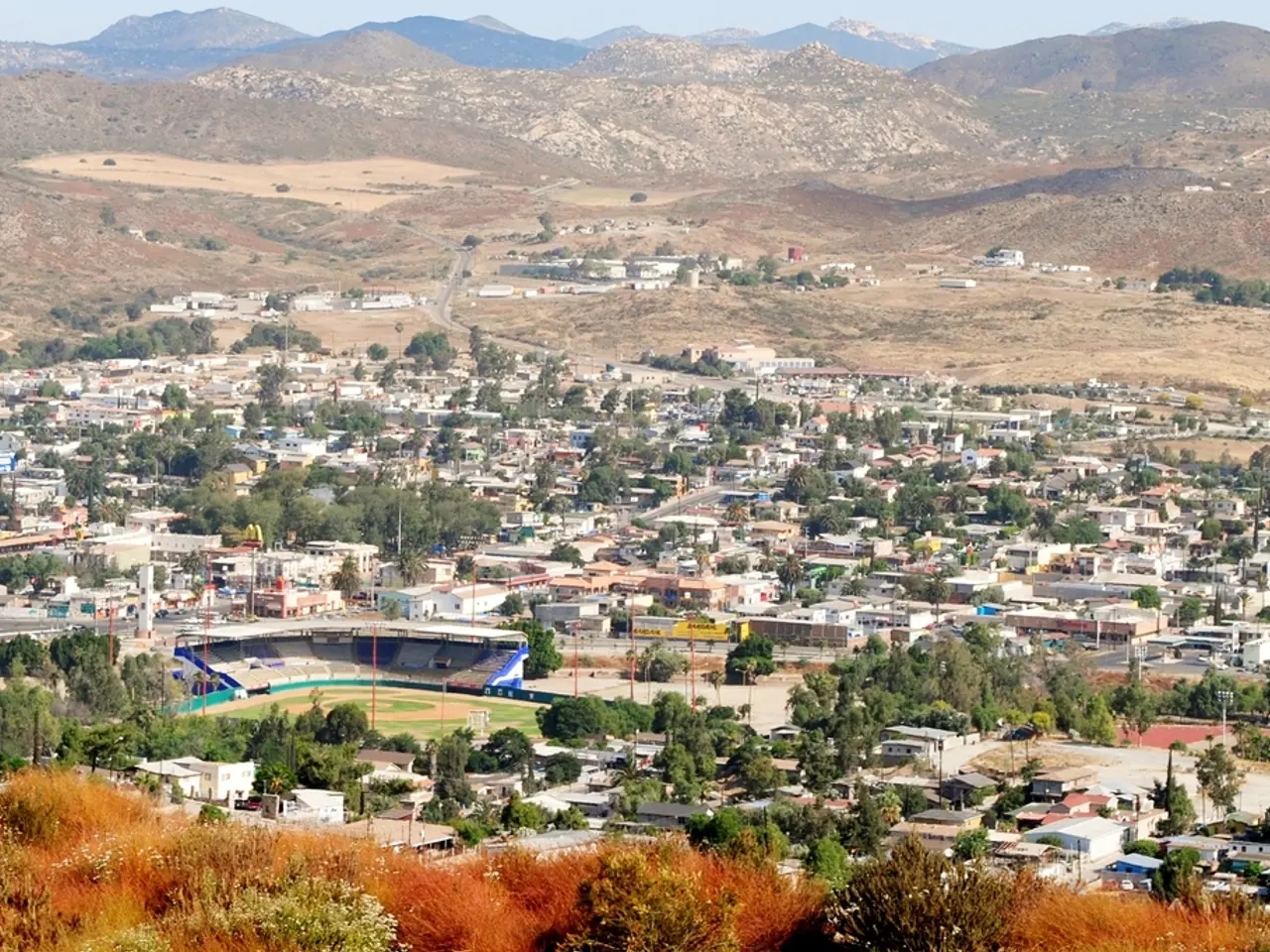Nuclear Ambitions of Iran: A Looming Threat? Trump's conflicting statements set international tension ablaze
U.S. President Trump's Political Shift Mirrors Netanyahu's, Rather than United States Intelligence
By Jack Davis
Amidst high-stakes geopolitical maneuvers, the looming specter of a potential Iranian nuclear bomb has placed the United States in a precarious position. The question of whether or not Iran is close to obtaining such a weapon has sparked an intense debate, with contrasting views from US intelligence agencies and the Israeli government.
Past History: The Lesson of Iraq
The historical parallels are clear as the US president demands "UNCONDITIONAL SURRENDER" from Iran. This time, it's not about biological or chemical weapons, but a nuclear threat. Is Trump making the Iran War an Iraq 2.0? A war with potential disastrous consequences and lasting repercussions akin to the US's unsuccessful invasion of Iraq in 2003.
Netanyahu pushes the Israel agenda
According to Israeli Prime Minister Benjamin Netanyahu, Israel had to act. If Iran was not stopped, it could be capable of producing an atomic weapon "in a very short time". "It could be a year. It could be a few months," said Netanyahu. "The information we received and shared with the United States was absolutely clear," he said in an interview with Trump's favorite channel, Fox News. It showed that Iran was working on a secret plan to make uranium into weapons.
Politics: A Dance of Shadows
However, the US intelligence agencies come to a completely different assessment. They assume that Iran stopped its nuclear weapons program in 2003, shortly after the US invasion of neighboring Iraq - apparently to avoid becoming a target itself. In March, Trump's intelligence director, Tulsi Gabbard, said in the intelligence committee of the US Senate that her agencies "continue to believe that Iran is not building nuclear weapons and that Supreme Leader Khamenei has not approved the nuclear weapons program that was stopped in 2003".
US Intelligence Remains Skeptical
Israel and the USA seem to agree on one thing: Iran has made advancements in its nuclear program in recent months. According to the US intelligence agencies, even these hints only show that Iran continues to research nuclear weapons, as reported by the "Wall Street Journal" (WSJ) citing several sources. The USA and Israel agree that Iran has brought itself into a stronger position for building an atomic bomb in the near future, according to the WSJ. However, the agencies still believe that Iran has not yet made a decision to advance the construction of a bomb. Exactly this position was represented by Gabbard in Congress in March.
Politics: Trump's Shifting Loyalties
Trump, however, does not seem to share this assessment by his intelligence services. On Tuesday, on his return flight from the G7 summit in Canada, he said in response to a question about how close Iran was to a nuclear weapon: "Very close." When asked about his intelligence director's statement from March, which contradicted this, he said: "I don't care what she said. I believe they were very close to having one."
It remains unclear what Trump's statements are based on. On the Israeli information that Netanyahu spoke of, which, according to the "Wall Street Journal," was not particularly new? It also remains unclear whether Trump wanted to pave the way for an Israeli-Iranian war with his remarks.
The Red Line: Three Years Away
This is not a false alarm, but also not an immediate alert - rather, a warning of an approaching danger. That's how the reports from the International Atomic Energy Agency (IAEA) sounded. The IAEA declared for the first time in almost twenty years on June 12 that Iran had violated its obligations not to proliferate nuclear weapons. Furthermore, the resolution states that Iran is not fully cooperating with the IAEA and therefore the organization cannot guarantee that Iran's nuclear program serves exclusively peaceful purposes.
In response to the resolution, Iran announced that it would build a new uranium enrichment facility and even increase its production of enriched uranium. Just two weeks earlier, on May 31, the IAEA reported that Iran had increased its stockpile of 60% uranium to 408.6 kilos. As early as March, when the stockpile was still 182 kilos, IAEA chief Rafael Grossi stressed that Iran was the only country without nuclear weapons enriching uranium to such high levels, which caused him "serious concern."
The Final Countdown
Grossi estimates that Iran would still need a few years to build an operational rocket with a nuclear warhead. This matches an assessment by the US intelligence services, also reported by CNN: According to this, Iran is up to three years away from being able to build and deploy an atomic bomb.
A Way Forward: Diplomacy or War?
Trump's shifting stance on negotiations with Iran highlights the difficult path ahead for the international community. After initially intent on dialogue, Trump has increasingly suggested military action. "I think we might have to help [Israel]," Trump said on June 9, following a phone call with Netanyahu. Yet, Iran's continued violations of nuclear safeguards and refusal to answer questions regarding past activities raise serious concerns about its intentions.
As the clock ticks, the international community must urgently consider potential next steps: sanctions, diplomatic pressure, or military intervention? With so much at stake, the world watches as history unfolds.
[1] "Iran's nuclear program: What's the latest?" BBC News (June 13, 2023). [2] "Iran's nuclear program: An analysis of recent advances." The Wilson Center (June 11, 2023). [3] "Iran nuclear progress triggers debate over military intervention." The New York Times (June 15, 2023). [4] "Iran nuclear program: A timeline of events." The Guardian (June 13, 2023).
- Iran
- Iranian nuclear program
- USA
- Israel
- Donald Trump
- Benjamin Netanjahu
- United Nations
- International Atomic Energy Agency
- Non-Proliferation Treaty
- Negotiations
- Military intervention
- Nuclear weapons
- Iraq War
- Geopolitics
Enrichment Data:
- Iran's nuclear program has advanced significantly in recent months, with enriched uranium stocks and rapid enrichment capabilities sufficient for multiple weapons.
- Iran has steadily increased its production of uranium enriched to 60%, far beyond civilian needs, indicating a possible intention to pursue nuclear weapon development.
- The International Atomic Energy Agency (IAEA) has found Iran non-compliant in a June 2023 resolution, and Iran's parliament is drafting legislation that could lead to its withdrawal from the Non-Proliferation Treaty, signaling a potential shift towards overt nuclear weapons development.
- Iran has a strong research and development program in weaponization, including the design and manufacture of neutron initiators and explosive compressions tests.
- Iran also possesses delivery systems like ballistic missiles and cruise missiles that are nuclear-capable, a key component for a functional nuclear arsenal.
The Commission, in light of the international tension surrounding Iran's nuclear ambitions, has also been asked to submit a proposal for a directive on the protection of workers from the risks related to exposure to ionizing radiation in war-and-conflicts scenarios, considering the possible extensive use of such radiation in future conflicts.
Meanwhile, politics continue to dominate the landscape, with shifting loyalties and conflicting statements from global leaders, including US President Donald Trump, raising questions about the legitimacy of intelligence reports and the potential for military interventions. In this context, the General News must closely monitor the situation, paying attention to the complex web of alliances, interests, and tensions that underpin this issue, and weigh the potential consequences of any decision made in this domain.








